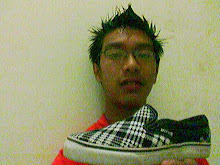
DENTAL personnel play an important role in providing the best evidence-based information and advice about toothbrushing and toothpaste to their clients as they hold the best position in curbing the onset of oral diseases in the country.
This was stated by Dr James Moh Kiong, senior dental officer from the Department of Dental Services, who provided pointers to some 100 dental surgery assistants yesterday on the best advices to give patients, which should be well-informed, consistent and scientifically valid.
Dr James presented his lecture on "Toothbrushing and toothpaste - What advice should we give to our clients?" at the first National Dental Assistant Symposium where he handed out questionnaires to the dental assistants to determine what advice they would provide to their clients on various aspects of toothbrushing and toothpaste.
The senior dental officer's presentation looked at evidence to support the advice that dental professionals should give their clients on toothbrushing and toothpaste.
A common question by patients pertains to what age children should start having their teeth brushed, to which Dr James responded that dental assistants should advise parents to have their children's teeth brushed once their milk teeth have started to appear.
Other advice included recommending clients to brush their teeth manually for three minutes, changing the present method of brushing with a systematic approach to have most plaque removed and suggesting the use of a small-headed toothbrush with soft, round-ended filaments with a compact, angled arrangement of long and short filaments and a comfortable handle.
According to Dr James, the use of powered toothbrushes is considered more effective in removing and reducing gingivitis than manual toothbrushes, especially for individuals who are unable to maintain an effective level of plaque control and periodontal health.
Dr James also spoke of the three factors which influence the efficacy of fluoride toothpastes, which are fluoride concentration, frequency in brushing and post-brushing rinsing behaviour.
Individuals should also be advised not to rinse or do so briefly with a small amount of water and to brush their teeth twice a day or more, which increases the preventive fraction by 14 per cent as opposed to brushing once a day.
Lectures from other officers within the department and officers from the Civil Service Institute (IPA) were also presented during the symposium.
The two-day symposium culminated in a closing ceremony held at the IPA yesterday, which saw the department's chief executive officer, Hjh Norsiah Hj Johari presenting certificates to the participants.


















No comments:
Post a Comment